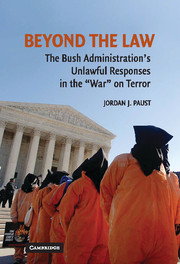Book contents
- Frontmatter
- Contents
- Preface
- Acknowledgments and Permissions
- ONE Executive Plans and Authorizations to Violate International Law Concerning Treatment and Interrogation of Detainees
- TWO Additional Revelations Concerning Treatment, Secret Detentions, and Secret Renditions
- THREE War and Enemy Status
- FOUR Judicial Power to Determine the Status and Rights of Persons Detained Without Trial
- FIVE Executive Claims to Unchecked Power
- SIX Antiterrorism Military Commissions
- Notes
- Name Index
- Subject Index
FOUR - Judicial Power to Determine the Status and Rights of Persons Detained Without Trial
Published online by Cambridge University Press: 24 November 2009
- Frontmatter
- Contents
- Preface
- Acknowledgments and Permissions
- ONE Executive Plans and Authorizations to Violate International Law Concerning Treatment and Interrogation of Detainees
- TWO Additional Revelations Concerning Treatment, Secret Detentions, and Secret Renditions
- THREE War and Enemy Status
- FOUR Judicial Power to Determine the Status and Rights of Persons Detained Without Trial
- FIVE Executive Claims to Unchecked Power
- SIX Antiterrorism Military Commissions
- Notes
- Name Index
- Subject Index
Summary
INTRODUCTION
When the United States was formed, Alexander Hamilton reiterated a trenchant warning that “the practice of arbitrary imprisonments, [has] been, in all ages, the favorite and most formidable instrument[] of tyranny.” His warning remains relevant today, and the consequences of arbitrary detention, whether or not tyrannical in purpose, still threaten liberty and democratic values.
After the September 11 attacks on the United States in which terrorists hijacked four airplanes, crashing two of them into the World Trade Center and one into the Pentagon, the United States detained thousands of persons. The detentions raised several critical questions: Are there any legal limitations on Executive discretion to detain persons accused of participation in acts of terrorism or who are suspected of posing significant threats to national security? Is arbitrary detention proscribed and, if so, what is the proper role of the judiciary in response? Are Executive determinations of the status and rights of detainees reviewable in federal courts and, if so, what is the proper standard for judicial review?
Since September 11, the Bush administration has claimed a right to detain without trial any member of al Qaeda or the Taliban or other persons allegedly posing threats to national security as “enemy” or “unlawful” combatants, whether captured in or outside of a war in Afghanistan or Iraq and whether or not they are being detained in the United States, Afghanistan, Guantanamo Bay, or other countries.
- Type
- Chapter
- Information
- Beyond the LawThe Bush Administration's Unlawful Responses in the "War" on Terror, pp. 65 - 85Publisher: Cambridge University PressPrint publication year: 2007



